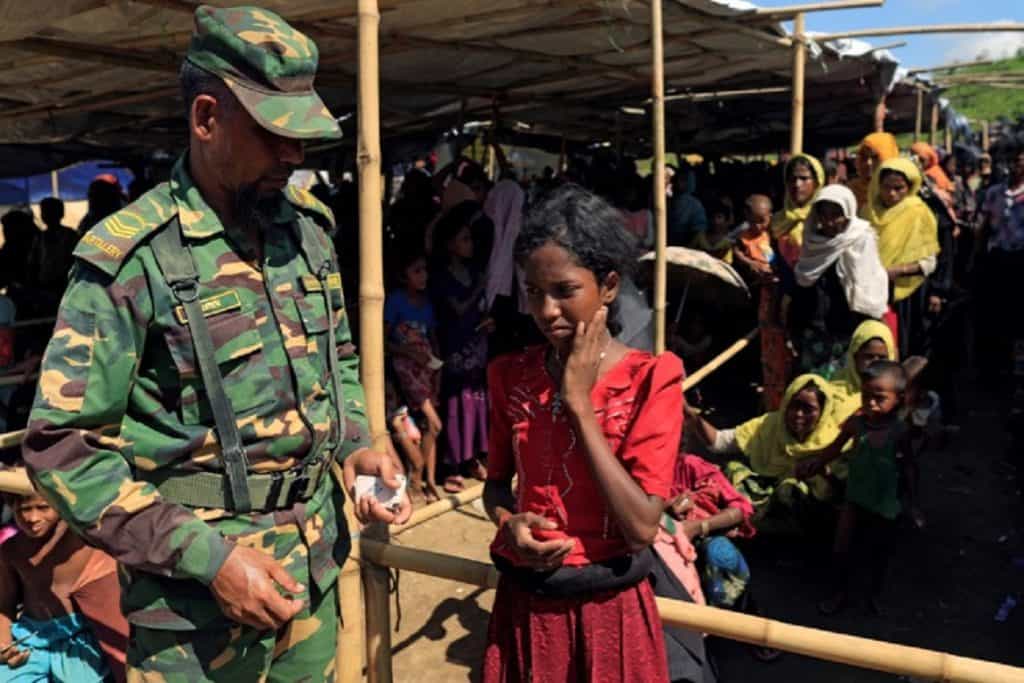In 2017, tensions between Buddhist and Muslim communities in Myanmar’s Rakhine State were escalating radically. A series of attacks by Rohingya militant group Arakan Rohingya Salvation Army (ARSA) on military and police outposts killing more than twelve Burmese security personnel triggered a brutal crackdown on Rohingya villages, launched by the Burmese military.
As a result, an unprecedented number (more than 700,000) of Rohingya Muslim refugees initiated escaping from the Rakhine state for neighboring Bangladesh and the ‘Rohingya Crisis’ begun.
The Rohingyas- Who are they?
The Rohingyas claim that they are aboriginal to Western Myanmar over a millennium and are descendents of Arabs, Mughals and Portugese, belonging to the Arakan region which was a sovereign empire between Southeast Asia and Indian subcontinent. Basically, the Rohingyas are Muslims, one of the many ethnic minorities of Buddhist dominated Myanmar with population over 1.3million (2017). Majority of the Rohingyas reside in the Rakhine State and they have their own language and culture.
However, the Myanmar government denies the Rohingya citizenship, considering them as illegal immigrants from neighboring Bangladesh and even excluding them from the census polls, leaving them stateless. They are not even included in the 135 official ethnic groups that comprise the foundation of the country. This systematic discrimination against the Rohingya people has left them living in deplorable conditions and segregated, with limited access to schools, healthcare and jobs, according to Amnesty International. Amnesty describes the Rohingya as “one of the most persecuted minorities in the world.”
Background of the Crisis
The current Rohingya crisis is not a result of overnight attack of ARSA over the Burmese Security Force; rather it is a result of longstanding acrimony between the Rohingyas and the Buddhists of Myanmar. In historical perspective, Indians, particularly people of Bengal (now Bangladeshis) have a well developed trade relation with Myanmar (then Burma). With time, many of those traders have settled in Myanmar.
Moreover, during the British colonial period, many people from Muslim dominated eastern part of undivided India were brought to Burma for different works that resulted many harsh conditions for the local Burmese people, like loss of land to accommodate them under British pressure, loss of jobs, opposite polarity beliefs of religion etc. It fuelled extreme antipathy from local Myanmar people for those Muslims and impregnated the seed of animosity for them.
World War-II exacerbated this bitterness. The Rohingyas supported the British while many Buddhists supported the Japanese. After independence in 1948, the Muslims fought for equal rights in Myanmar, but were overpowered which further congealed the community division. Over time, the Rohingyas have been involved in further multiple civil disputes for decades with locals and also the Myanmar government that leaded to frequent occasions of fleeing refugees.
Migration of the Rohingyas
The Rohingyas have a long history of struggle officially being acclaimed as “refugee.” Neighbor Bangladesh has acknowledged the Rohingyas who entered its border before 1992 by providing them citizenship; however, Dhaka has refused to recognize any future influx of Rohingyas who flooded the refugee camps in Cox’s Baazar, Kutupalong and Nayapara as their own citizen. Those unfortunate Rohingyas are instead viewed as unregistered refugees and left to set up their own makeshift camps at the Southern-most peninsular camps, near Bangladesh-Myanmar border.
Since 1970s, significant numbers of Rohingyas are migrating from Myanmar to Bangladesh through the treacherous mountainous terrain and sea, risking their lives. The two most infamous cases of Rohingya refugee movement into Bangladesh dated long back in 1978 and 1990 where more than 200,000 Rohingya people escaped from Myanmar in each case.
However, actual numbers are of those refugees are often much higher than official figures. IN 2012, riot erupted out between the Rakhine Buddhists and the Muslim minorities that compelled the expulsion of thousands of Rohingyas into refugee camps in neighbor Bangladesh.They had to commence perilous journey from Rakhine state to evade the communal brutality and contended abuses by Myanmar armed forces, just before the recent crisis of 2017.
Current Crisis Scenario
Since August 25, 2017, the atrocities committed by state-backed Burmese military, including pervasive burning of numerous villages, mass killings- irrespective of age and gender, insurmountable sexual violence caused undeniable brutal crimes against humanity. Although, Myanmar military and government repeatedly denied that security forces have committed abuses during the operations, but the actual scenario of the entire Rakhine state could easily be depicted from extensive evidence and witness accounts, including satellite imagery
Nevertheless, the attack on Myanmar security forces, followed by an overwhelming counterattack on Rohingyas has engendered a burgeoning humanitarian crisis in modern world. According to UN, the predicament of thousands of Rohingyas is said to be ‘world’s fastest growing refugee crisis.’ The UN Secretary General Antonio Guterres attributed this crisis to be “a humanitarian and human rights nightmare” whilst the United Nations described the military offensive in Rakhine that provoked the exodus as a “textbook example of ethnic cleansing”.
UNHCR reports depicts that before Aug-2017, more than 305,000 Rohingya refugees were residing in Bangladesh based camps, makeshift settlements. A further 700,000 are estimated to have arrived since August 2017 and most of them- including men, women and children have appeared with barely any belongings, thus springing up the camp area towards the countryside.
Conclusion
Whatever may be the reasons, the inhuman ‘ethnic cleansing’ of Rohingyas should not be tolerated by any means. It has ushered in severe condemnation over the Myanmer government from the International community across the globe. It’s not only the Rohingyas have been suffering right now, but also the neighbor Bangladesh as the entire shifting of a massive toll possess solemn impact on Bangladesh’s population, food scarcity, hygiene and above all a serious National security threat. Apart from harsh criticism, UN and International community should take more responsible steps to curb the menace of this kind of act by a country.







